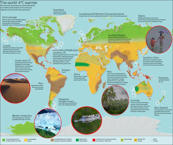I'm sure I've missed a good few similar discussions on SciForums in the last 2 years, but I just have to ask.
Here's an article published recently in The Sun newspaper, showing a fairly standard prediction of how the Earth might look after a 4 Centigrade temperature rise.
Note the prevalence of deserts - not merely spreading towards the poles, but spreading also right across the equator, obliterating rainforests and savannahs. :bawl:
Deserts are created more by the absence of water than by high temperatures. I am being too naive in assuming that, if the World overall is hotter, there will be more evaporation from the oceans - and hence more rain, not less? I would expect a climate conducive to the spread of jungles and swamps, much as the Earth was in Mesozoic times. :shrug: (Even if people have cleared all the remaining tropical forest by 2050, they will still farm the land as long as it rains).
As recently as the Eemian interglacial, the Earth was considerably warmer than today and sea levels were higher. If most of our land surface had been desert back then, we would have far less biodiversity today - especially in the tropics.
Does anyone know a reason why manmade global warming should produce such a dry and hostile world? Or are scenarios like this based on unscientific scaremongering?
Here's an article published recently in The Sun newspaper, showing a fairly standard prediction of how the Earth might look after a 4 Centigrade temperature rise.
Note the prevalence of deserts - not merely spreading towards the poles, but spreading also right across the equator, obliterating rainforests and savannahs. :bawl:
Deserts are created more by the absence of water than by high temperatures. I am being too naive in assuming that, if the World overall is hotter, there will be more evaporation from the oceans - and hence more rain, not less? I would expect a climate conducive to the spread of jungles and swamps, much as the Earth was in Mesozoic times. :shrug: (Even if people have cleared all the remaining tropical forest by 2050, they will still farm the land as long as it rains).
As recently as the Eemian interglacial, the Earth was considerably warmer than today and sea levels were higher. If most of our land surface had been desert back then, we would have far less biodiversity today - especially in the tropics.
Does anyone know a reason why manmade global warming should produce such a dry and hostile world? Or are scenarios like this based on unscientific scaremongering?

